译林版小学英语知识点汇总
译林版小学四年级英语下册_知识点复习总结 (1)
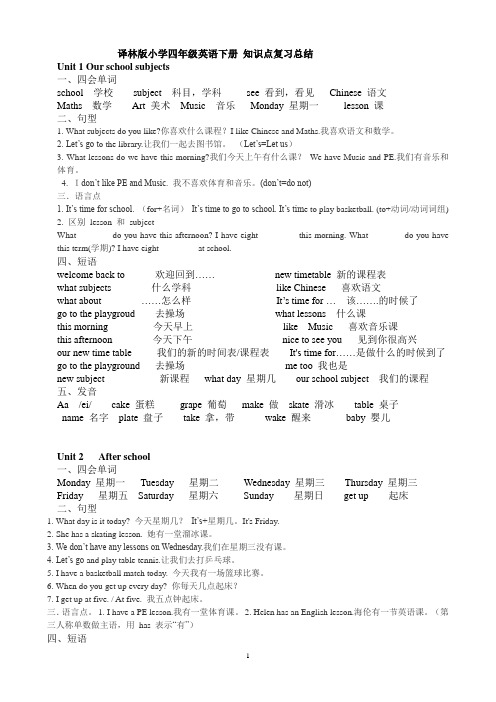
译林版小学四年级英语下册知识点复习总结Unit 1 Our school subjects一、四会单词school 学校subject 科目,学科see 看到,看见Chinese 语文Maths 数学Art 美术Music 音乐Monday 星期一lesson 课二、句型1. What subjects do you like?你喜欢什么课程?I like Chinese and Maths.我喜欢语文和数学。
2. Let’s go t o the library.让我们一起去图书馆。
(Let’s=Let us)3. What lessons do we have this morning?我们今天上午有什么课?We have Music and PE.我们有音乐和体育。
4. Idon’t like PE and Music. 我不喜欢体育和音乐。
(don’t=do not)三.语言点1. It’s time for school. (for+名词)It’s time to go to school. It’s tim e to play basketball. (to+动词/动词词组)2. 区别lesson 和subjectWhat _______ do you have this afternoon? I have eight ________ this morning. What _______ do you have this term(学期)? I have eight ________ at school.四、短语welcome back to 欢迎回到……new timetable 新的课程表what subjects 什么学科like Chinese 喜欢语文what about ……怎么样It’s time for …该…….的时候了go to the playgroud 去操场what lessons 什么课this morning 今天早上like Music 喜欢音乐课this afternoon 今天下午nice to see you 见到你很高兴our new time table 我们的新的时间表/课程表It's time for……是做什么的时候到了go to the playground 去操场me too 我也是new subject 新课程what day 星期几our school subject 我们的课程五、发音Aa /ei/ cake 蛋糕grape 葡萄make 做skate 滑冰table 桌子name 名字plate 盘子take 拿,带wake 醒来baby 婴儿Unit 2 After school一、四会单词Monday 星期一Tuesday 星期二Wednesday 星期三Thursday 星期三Friday 星期五Saturday 星期六Sunday 星期日get up 起床二、句型1. What day is it today? 今天星期几?It’s+星期几。
译林小学英语1-6年级英语知识点大搜集大汇总
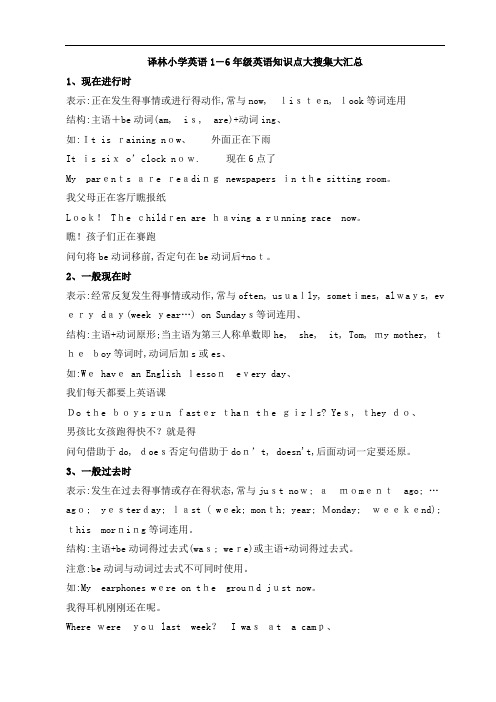
译林小学英语1-6年级英语知识点大搜集大汇总1、现在进行时表示:正在发生得事情或进行得动作,常与now, listen, look等词连用结构:主语+be动词(am, is, are)+动词ing、如:It is raining now、外面正在下雨It is six o’clock now. 现在6点了My parents are reading newspapers in the sitting room。
我父母正在客厅瞧报纸Look! The children are having a running race now。
瞧!孩子们正在赛跑问句将be动词移前,否定句在be动词后+not。
2、一般现在时表示:经常反复发生得事情或动作,常与often, usually, sometimes, always, ev ery day(week year…) on Sundays等词连用、结构:主语+动词原形;当主语为第三人称单数即he, she, it, Tom, my mother, theboy等词时,动词后加s或es、如:We have an English lessonevery day、我们每天都要上英语课Do the boys run faster than the girls? Yes, they do、男孩比女孩跑得快不?就是得问句借助于do, does否定句借助于don’t, doesn't,后面动词一定要还原。
3、一般过去时表示:发生在过去得事情或存在得状态,常与just now; amomentago; …ago; yesterday; last ( week; month; year; Monday; weekend); this morning等词连用。
结构:主语+be动词得过去式(was; were)或主语+动词得过去式。
注意:be动词与动词过去式不可同时使用。
如:My earphones were on the ground just now。
小学英语语法大全归纳总结译林版
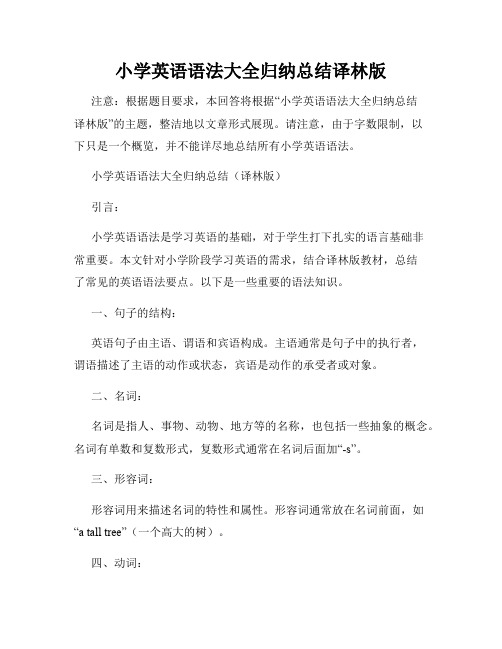
小学英语语法大全归纳总结译林版注意:根据题目要求,本回答将根据“小学英语语法大全归纳总结译林版”的主题,整洁地以文章形式展现。
请注意,由于字数限制,以下只是一个概览,并不能详尽地总结所有小学英语语法。
小学英语语法大全归纳总结(译林版)引言:小学英语语法是学习英语的基础,对于学生打下扎实的语言基础非常重要。
本文针对小学阶段学习英语的需求,结合译林版教材,总结了常见的英语语法要点。
以下是一些重要的语法知识。
一、句子的结构:英语句子由主语、谓语和宾语构成。
主语通常是句子中的执行者,谓语描述了主语的动作或状态,宾语是动作的承受者或对象。
二、名词:名词是指人、事物、动物、地方等的名称,也包括一些抽象的概念。
名词有单数和复数形式,复数形式通常在名词后面加“-s”。
三、形容词:形容词用来描述名词的特性和属性。
形容词通常放在名词前面,如“a tall tree”(一个高大的树)。
四、动词:动词表示行动、状态和发生的事件。
动词有不同的时态形式,例如现在时、过去时和将来时。
动词的时态可以通过动词的变化,如加“-ed”或“-ing”,来表示。
五、副词:副词用来描述动词、形容词和其他副词。
副词通常放在动词前面,如“I run quickly”(我跑得快)。
六、代词:代词用于代替名词,以避免重复。
常见的代词包括“he”(他),“she”(她),“it”(它)等。
七、介词:介词用于连接名词和其他词。
常见的介词包括“in”(在),“on”(在……上),“at”(在……处)等。
八、冠词:冠词用于修饰名词,表示特指或泛指。
常见的冠词有“a”(一个),“an”(一个,用于元音开头的词前)和“the”(这,那)。
九、连词:连词用于连接词语、短语和句子。
常见的连词包括“and”(和),“but”(但是),“or”(或者)等。
十、语序:英语中的语序通常为主语-谓语-宾语的顺序。
但是,疑问句的语序为谓语-主语-宾语。
结论:通过本文对小学英语语法的概要介绍,我们可以看到语法是学习英语的重要基础。
译林版小学英语六年级上册知识点(全)

译林版⼩学英语六年级上册知识点(全)Unit 1 The King’s new clothes ⼀、词汇1.有魔⼒的magic2.聪明的clever3.想think4.愚蠢的foolish5.穿过through6.笑,⼤笑laugh7.穿wear8.讲,叙述tell9.每个each10.说say11.句⼦sentence12.迅速的,快的quick13.下⼀个next14.⼩的little15.机会turn16.努⼒地,费劲地hard17.孩⼦child (复数children)⼆、短语1.皇帝的新⾐the king’s new clothes2. 某⼀天one day3. 拜访国王visit the king4.两个男⼦/⼥⼦two men/women5.穿过城市walk through the city6. 试穿try on7.这些魔法these magic clothes8.为你做新⾐服make new clothes for you9. 在街上in the street10.给国王看他的新⾐show the king his new clothes11.聪明的⼈clever people12.愚蠢的⼈foolish people13.看着国王look at the king14.穿着他的新⾐in his new clothes / wear his new clothes15.⼀个⼩男孩a little boy16.指着国王point at/to the king17.⾮常合⾝fit well18. 今天下午this afternoon19. ⼀张来⾃我好友Mark的卡a card from my good friend Mark20. 来参加我的聚会come to my party21.在四点半at half past four22.在公园⾥in the park23.⼀个美国⽜仔an American cowboy 24.穿着⽜仔裤wear jeans25.⼀个苏格兰男⼠a Scottish man26. 穿⼀条苏格兰裙wear a kilt27. 讲故事tell a story28. 狐狸⽼师和她的学⽣们Miss Fox and her students29. 在⼭上on the mountain30.下⼀句the next sentence31.给男孩讲了⼀个故事tell the boy a story32.努⼒地想think hard33.不得不重新开始讲故事have to start the story again34.住在森林⾥live in the forest35. ⽣病了be sick/be ill36.在狮⼦的房⼦前⾯in front of the lion’s house37.在房⼦旁边散步walk by the house38.照顾他look after him39.愤怒的狮⼦the angry lion40.对着⽼⼈⼤喊shout at the old man41.把你的孩⼦给我give me your child =give your child to me42. 背诵课⽂recite the text43.和狮⼦住在⼀起live with the lion44.对她很好be nice to her45.变成⼀个王⼦turn into a prince三、句⼦1.很久以前,有个国王。
苏教译林版小学英语3-6年级知识点总结
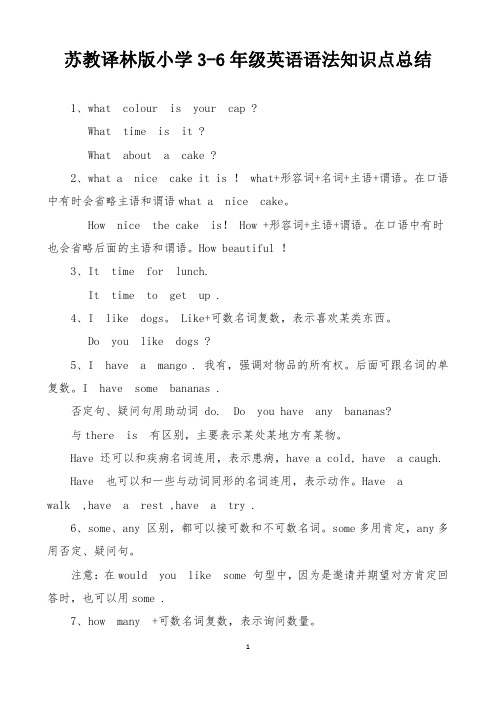
苏教译林版小学3-6年级英语语法知识点总结1、what colour is your cap ?What time is it ?What about a cake ?2、what a nice cake it is ! what+形容词+名词+主语+谓语。
在口语中有时会省略主语和谓语what a nice cake。
How nice the cake is! How +形容词+主语+谓语。
在口语中有时也会省略后面的主语和谓语。
How beautiful !3、It time for lunch.It time to get up .4、I like dogs。
Like+可数名词复数,表示喜欢某类东西。
Do you like dogs ?5、I have a mango . 我有,强调对物品的所有权。
后面可跟名词的单复数。
I have some bananas .否定句、疑问句用助动词 do. Do you have any bananas?与there is 有区别,主要表示某处某地方有某物。
Have 还可以和疾病名词连用,表示患病,have a cold, have a caugh.Have 也可以和一些与动词同形的名词连用,表示动作。
Have awalk ,have a rest ,have a try .6、some、any 区别,都可以接可数和不可数名词。
some多用肯定,any多用否定、疑问句。
注意:在would you like some 句型中,因为是邀请并期望对方肯定回答时,也可以用some .7、how many +可数名词复数,表示询问数量。
8、 What would you like ?或 would you like ……?表示礼貌征求别人意见或建议。
What would you like for breakfast?Would you like some apple juice ?(juice不可数,所以用some )9、how much is it ? 意思是多少钱?如果物品是复数,how much are they10、what subject do you like ?What lessons do you have today ?11、when do you go to school ?对时间提问。
译林小学四年级英语知识点
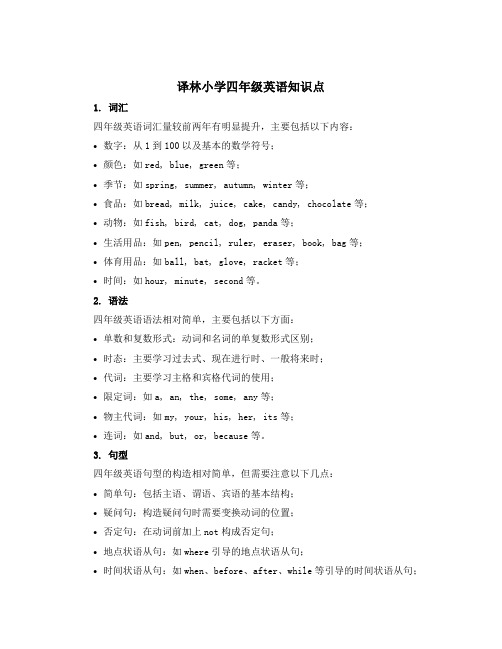
译林小学四年级英语知识点1. 词汇四年级英语词汇量较前两年有明显提升,主要包括以下内容:•数字:从1到100以及基本的数学符号;•颜色:如red, blue, green等;•季节:如spring, summer, autumn, winter等;•食品:如bread, milk, juice, cake, candy, chocolate等;•动物:如fish, bird, cat, dog, panda等;•生活用品:如pen, pencil, ruler, eraser, book, bag等;•体育用品:如ball, bat, glove, racket等;•时间:如hour, minute, second等。
2. 语法四年级英语语法相对简单,主要包括以下方面:•单数和复数形式:动词和名词的单复数形式区别;•时态:主要学习过去式、现在进行时、一般将来时;•代词:主要学习主格和宾格代词的使用;•限定词:如a, an, the, some, any等;•物主代词:如my, your, his, her, its等;•连词:如and, but, or, because等。
3. 句型四年级英语句型的构造相对简单,但需要注意以下几点:•简单句:包括主语、谓语、宾语的基本结构;•疑问句:构造疑问句时需要变换动词的位置;•否定句:在动词前加上not构成否定句;•地点状语从句:如where引导的地点状语从句;•时间状语从句:如when、before、after、while等引导的时间状语从句;•原因状语从句:如because引导的原因状语从句。
4. 听力四年级英语听力的难度相对于前几年的增加,需要学习听懂以下类型的对话:•询问、给予指示的对话:学习了解和运用ask, answer, give directions 等基本用语;•介绍、询问人物信息的对话:学习用where, who, what等词型询问和介绍人的基本信息;•询问和讨论事情的对话:学习运用when, where, how等基本疑问词来询问事情;•询问和讨论时间的对话:学习了解和运用基本时间概念和词汇,如days of the week、months of the year等。
译林英语五年级复习知识点

译林新版小学五年级下册知识点整理Unit 1知识点一、单词:because 因为 fairy 仙女 fit 合适,合身have to 不得不,必须 leave…behind 留下,丢下mushroom 蘑菇 prince 王子 understand 明白,理解pick 摘,拾 take off 脱下 be bad for有害的clothes 衣服 let 让 put on 穿上 before 在…以前try on 试穿 late 迟的 pick 摘二、词组:at the prince’s house 在王子的房子 be sad 伤心go to the party 去聚会 don’t have any nice clothes or shoes 没有漂亮的衣服或鞋子come back 回来 have a good time 过得愉快at the party 在聚会 take off 脱下 try on 试穿 have to go 必须走leave…behind 留下,丢下 in the forest 在深林里under a tree在一棵树下 pick a big red mushroom摘一个大红色的蘑菇look so nice 看起来很漂亮 are bad for us 对我们有害的三、句型:Why are you so sad ? 你为什么这么伤心?Because I can’t go to the party. 因为我不能去参加聚会。
Why?为什么?Because I don’t have any nice clothes and shoes.因为我没有漂亮的衣服或鞋子。
四、语法:can’t = can not don’t =do notUnit 2知识点一、单词:far from 离……远 near 在……附近 by …乘……bus 公共汽车,大巴士 on foot 步行 metro 地铁taxi 出租车,的士 bike自行车 plane 飞机 ship轮船train 火车 ride 骑车 show 给……看 basket 篮子city城市二、词组:your new home 你的新家 very big 很大 far from school 离学校远live on Moon Street 住在月亮街上near City Library在城市图书馆附近 come to school 来学校 by bus 乘公共汽车 on foot 步行by metro 乘地铁by taxi 乘出租车 a taxi driver 一位出租车司机in the park 在公园里 can fly 会飞 show his bike to sam 展示他的自行车给山姆看too young 太小(年龄) sit in the basket 坐在篮子里三、句型:Where do you live?你住在哪里?I live …我住在…… I live near/ far from…我住在附近/离远How do you come to school? 你怎样来学校的?I come to school…我来学校……Unit 3知识点一、单词:along 沿着,顺着 ask the way 问路 ask…for help 向……求助full 满的,饱的 get to 到达 next to 在……旁边on your right 在你的右侧。
译林小学英语六年级下册Unit1-8知识点汇总

Unit 1 The lion and the mouse一、单词mouse老鼠large大的strong强大的, 强壮的quietly小声地, 安静地loudly大声地net网bite咬sharp锋利, 尖的ask问soon不久, 很快happily开心地, 高兴地weak弱的, 软弱的cheer欢呼, 加油hit打, 击ground地面, 地上deep深reach够得着二、词组1. in the forest 在森林里2. very large 很大3. large and strong 又大又强壮4. one day 一天5. walk by 走过6. wake the lion up 吵醒狮子7. be angry 生气8. want to eat the mouse想吃老鼠9. help you 帮助你10. some day 某一天11. say quietly 小声地说12. so small and weak 这么小而弱13. laugh loudly 大声地笑14. let the mouse go 让老鼠走15. the next day 第二天16. two men 两个男人17. catch the lion with a large net 用一张大网捉住狮子18. bite the net 咬网19. his sharp teeth 他锋利的牙齿20. get out 出去21. ask sadly 伤心地问22. just then 就在那时23. make a big hole 弄了个大洞24. in the net 在网里25. say happily 开心地说26. from then on 从那时起27. become friends 变成朋友28. get out from the net 从网里出来29. help sb. do sth. 帮助某人做某事30. a happy boy 一个开心/幸福的男孩31. talk excitedly 兴奋地交谈32. the sweet shop 糖果店33. want to buy 想要买34. a lollipop 一个棒棒糖35. Aesop’s Fables 伊索寓言36. find many animal stories找到许多动物故事37. a Chinese idiom book 一本中国成语书38. play table tennis happily 开心地打乒乓39. be good at table tennis 擅长打乒乓40. cheer for them loudly 为他们大声地欢呼41. too excited 太兴奋42. hit the ball hard 用力打球43. find the ball 找到球44. find a hole in the ground 在地上找到一个洞45. in the hole 在洞里46. too deep 太深47. can’t reach it 够不着它48. have an idea 有一个主意49. bring some water quickly很快拿来一些水50. pour it into the hole 把它倒进洞里51. so many balls 这么多球52. go to a shopping centre 去购物中心53. see a small boy 看见一个小男孩54. on the floor 在地板上55. take him to an office 带他去办公室56. give him a sweet 给他一颗糖57. become happy 变得高兴58. like helping people 喜欢帮助人们59. make a study plan 制定一个学习计划60. read quietly 安静地看书61. a weak animal 一个弱小的动物62. a sharp knife 一把锋利的刀63. walk by走过, 路过64. wake . . . up吵醒, 叫醒65. some day 某一天66. the next day第二天67. just then就在那时68. get out出来, 出去69. from then on从那时起70. pour… into把…. . . 倒入三、重点句型1. One day, a mouse walked by and woke the lion up. 一天, 一只老鼠走过, 吵醒了狮子。
- 1、下载文档前请自行甄别文档内容的完整性,平台不提供额外的编辑、内容补充、找答案等附加服务。
- 2、"仅部分预览"的文档,不可在线预览部分如存在完整性等问题,可反馈申请退款(可完整预览的文档不适用该条件!)。
- 3、如文档侵犯您的权益,请联系客服反馈,我们会尽快为您处理(人工客服工作时间:9:00-18:30)。
译林版小学英语知识点汇总Sorry。
XXX in the given text。
However。
here is a XXX:Unit 1: In Class Knowledge Review1.Vocabulary: shout。
eat。
run。
talk。
sleep。
drink。
here。
your。
English。
milk.2.Phrases: Mr。
Green。
open your books。
close the window。
come in。
good afternoon。
good night。
open the door。
look atthe blackboard。
good morning。
good evening。
listen to the teacher.3.XXX:XXX up.Sit down。
please.Good morning。
Mr。
Green.Come in。
Mike.Liu Tao。
please open the door.Yes。
Mr。
Green.I'm sorry。
Mr。
Green.Wang Bing。
please close the window.Look at the blackboard。
XXX.Don't listen to the parrot.4.Knowledge Points:XXX "b" usually makes the sound /b/。
as in "book," "bike," "bag," etc.XXX "mb" and "bt" at the end of words are silent。
as in "bomb," "climb," "comb," "debt," "doubt," etc.Unit 2: In the Library Knowledge Review1.Vocabulary: shout。
eat。
run。
talk。
sleep。
drink。
here。
your。
English。
milk.2.Phrases: in the library。
in the classroom。
want to。
don't = do not.3.XXX:I want to borrow a book.Don't talk in the library.Can I read this book?XXX.This is an English book.I don't want to run.Do you want to drink milk?Here is my library card.Let's go to the classroom.Note: The content and format of the original text were already XXX.1.Don’t shout。
eat。
run。
talk。
sleep。
or drink。
Avoid making loud noises。
eating。
running。
talking。
sleeping。
or drinking.2.I apologize。
I'm sorry.3.I would like to rest。
I want to sleep.Unit 3 Is this your pencil。
Knowledge Points (Posted on page 23 of the textbook)1.Vocabulary:XXXschoolbagXXXcrayonrulerpencil caseXXX boxwhereover there2.Phrases:my pencilyour XXX boxon the floorXXX doorover therefor you3.XXX and grammar:1) Asking about the ownership of an item and its answer: Is this/that your。
Yes。
it is。
/ No。
it isn't.Your can be XXX.2) Introducing one's own item:This/That is my。
This/That XXX。
3) Asking about the n of a person or item:Where is/are + someone/something?Practice:1.Where is my book?2.Where are my books?3.Where is Sam?4.Where are Sam and Bobby?4.XXX: affirmative sentences with "be" verb Method:wake up醒来XXX up赶快get up起床go to bed上床睡觉how old多大年纪three years old三岁four years old四岁five years old五岁six years old六岁seven years old七岁eight years old八岁nine years old九岁ten years old十岁三、句型1.How old are you。
你多大年纪?2.I'm three years old。
我三岁了。
3.Hurry up。
赶快!4.What time do you get up。
你几点起床?5.I go to bed at nine o'clock。
我九点钟上床睡觉。
四、知识点1.表示年龄的句型:How old are you。
I'm + 年龄 + years old.2.表示时间的句型:What time do you + 动词原形。
I + 动词原形 + 时间。
3.表示起床和睡觉的动词短语:wake up。
get up。
go to bed。
4.表示数字的单词:one。
two。
three。
four。
five。
six。
seven。
eight。
nine。
ten。
How old are you。
- What is your age?How lovely。
- How adorable!I’m。
(年龄)。
- My age is。
Here you are。
- Here you go.What a nice cake。
- XXX!Make a wish。
- Make a wish now.It’s time for the cake。
- It's time to have the cake!Don’t be late for class again。
- XXX class again.1.注意区分:How old are you和How are you前者问年龄,后者问身体。
前者的答句为:I’m+ 数字,表示自己几岁,后者的答句可以为:I’m fine/good / well … - It's important to distinguish een "How old are you?" and "How are you?" The former asks for age and the answer would be "I'm (age)"。
whilethe latter asks for one's health and the answer could be "I'mfine/good/well。
"2.两种类型的感叹句在情境中的使用。
如How lovely。
What a nice cake。
- These two types of XXX。
"How lovely!" and "What a nice cake!".Happy birthday。
- 生日快乐!A nice cake - 一个美味的蛋糕Make a wish - 许一个愿望Want a robot - 想要一个机器人Be late - 迟到Two - 二XXX - 五Eight - 八Eleven - 十一O'clock - ……点钟Class - 课;上课Lunch - 午餐Three - 三Six - 六Nine - 九XXX - 十二Breakfast - 早餐Dinner - 晚餐;晚饭These - 这些Unit 6 What time is it?一、单词Mum - 妈妈O'clock - ……点钟Breakfast - 早餐;早饭Class - 课;上课Dinner - 晚餐;晚饭Bed - 床OK - 好;行Lunch - 午餐;午饭Eleven - 十一XXX - 十二Bag - 包;书包These - 这些二、词组Wake up - 醒;醒来Hurry up - 快点Here's。
= Here is。
- 这是。
What time - 什么时间Time for class - 上课时间Time for dinner - 晚饭时间Time for bed - 睡觉时间Breakfast is ready - 早饭准备好了三、句型1.What time is it。
- It's (time).2.What's the time。
- It's (time).3.It's time to do something。
4.It's time for something。
5.What is this。
6.What are these。
Unit 7 On the Farm Knowledge Points:1.Phrases:on the farme to。
2.Verb phrases corresponding to nouns: have breakfast (for breakfast)have lunch (for lunch)have dinner (for dinner)have a class (for a class)go to bed (for bed)3.These cows。
